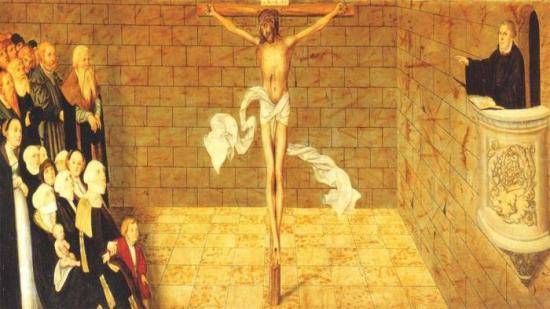The following comes from a post I wrote on August 13th, 2012 that I posted at another (now defunct) blog of mine. It was in response to another blogger’s series of posts on theological exegesis (he is a biblical studies guy). The following was a comment on one of his posts engaging with someone else in that thread. I still like most of what I wrote here. One thing I would add is that I think all of the Literary, Grammatical, Historical tools can and ought to be deployed, even within the Christological exegetical approach I am describing below. In other words, I am not interested, per se, in a figural or “allegorical” reading of the text; and yet, many these days seem to be attempting to recover that as well (even the Baptists!) I think a Christological exegetical (see some things I’ve had to say on this with reference to Calvin’s and Luther’s approaches) approach can appropriate text-critical advances, so on and so forth, as those might serve helpful in illuminating the meaning of Holy Scripture vis-à-vis its reality in Jesus Christ. I will have to elaborate on that further later. But for now, I give you the following:
[…] the theologian—worth their salt—ought to be working at and from a grammar that is demanded by the theo-logic present in God’s life Self-revealed and thus interpreted in Jesus Christ (cf. Jn. 1:18). But of course, this is always an open-ended dialectical and spiraling process; and it ought to be no other way, since we know, given the theo-logical implications of God’s Triune life that he is dynamic (V. static) relational, and a God of love who acts in grace (primarily known and exemplified in and through the Incarnation). So, I don’t want to collapse the barometer for the meaning (of scripture) into a textual linguistic socio-cultural community (a la Lindbeck), but I see (riffing on the patristic ‘rule of faith’) the analogy or lens or purpose of scripture shaped in and through the life of God revealed in Jesus Christ. I know that seems ethereal, and probably abstract, but what I don’t think is abstract—but instead concrete and particular—is the enfleshing of God in Christ. The theologian’s task is to lay bare the web of beliefs that necessarily flow from this reality; and I take, for example, the so-called ecumenical councils wranglings and wrestlings with this, early on, as exemplary of how Christians ought to seek to provide grammar for the theo-logic and christo-logic that scripture is presupposing upon in its occasional writings (which as Torrance would say is its ‘Depth Dimension’). So unlike, Brian (and NT Wright), I am not ready to look at the Patristic era and the theology “started” there as if it is part of some sort of “salad bar” wherein I can choose if I want to take some of this or that; no, I believe that we must listen to the teachers of the Church (the past) as if Jesus Christ himself gave them to her for her edification. But of course, I see this kind of “always reforming” principle as something that is an ongoing reality, and thus even the grammar provided in the Patristic era (as formative as it is!) is open to further clarification and critique (but not simple abandonment) as we continue to grow in the grace and knowledge of Jesus Christ, as we are moving toward attaining (finally!) the unity of the Faith. I am not interested in merely repristinating the past (we have the post-Reformed orthodox … and the Eastern Orthodox for that), but I am interested in engaging the past insofar as the rich and deep heritage provided therein fosters a depth relation to and understanding of our Triune God revealed in Jesus Christ. So my question to Brian was in fact really noting something, ironically, that I don’t think anyone can ensure; but then, I do think if we are going to be theological realists (which I am, or ‘critical’), and if we are going to do Theological Science (as TF Torrance does it, which also serves as a title for one of his books)—meaning that our categories and emphases for inquiry will be defined as the object of our consideration imposes ‘himself’ (or itself) upon us (Torrance calls this an ‘epistemological inversion’)—then the ground for arbitrating what is true and sure will indeed, and once again, be the theo-logic that is present from the revelation of God in Christ.
So, I know that much of my post is repetitive. The moral of my comment and belief can be summed up thusly: The revelation of God in Jesus Christ is the rule of faith by which all of the occasional writings of scripture (given the reality of all of their various types, genres and forms etc.) ought to be framed; because they all (even given their particularities and idiosyncrasies) trade on the same kergymatic reality of God’s life in Christ (or they all presume upon a theological reality about who God is, and that reality is only understood, according to scripture, through the explanation given in Jesus Christ cf. John 1:18).

